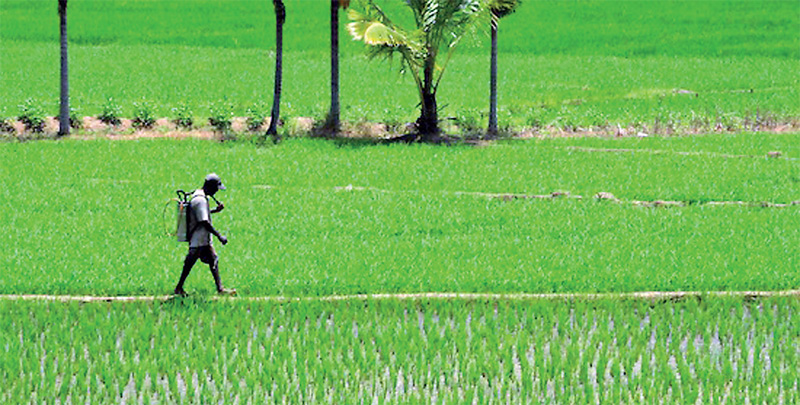Friday Feb 27, 2026
Friday Feb 27, 2026
Wednesday, 30 June 2021 00:00 - - {{hitsCtrl.values.hits}}

Many plantations which already have razor thin margins between production cost and income will have to close down, causing unemployment – Pic by Shehan Gunasekara
 “Bill Gates is obsessed with fertiliser. ‘I go to meetings where it is a serious topic of conversation’, he writes. ‘I read books about its benefits and the problems with overusing it. It is the kind of topic I have to remind myself not to talk too much about at cocktail parties, since most people don’t find it as fascinating a topic as I do’.”
“Bill Gates is obsessed with fertiliser. ‘I go to meetings where it is a serious topic of conversation’, he writes. ‘I read books about its benefits and the problems with overusing it. It is the kind of topic I have to remind myself not to talk too much about at cocktail parties, since most people don’t find it as fascinating a topic as I do’.”
“Why the fascination? He explains that 40% of people on earth owe their lives to higher crop outputs that were made possible only because of fertiliser. It was the literal fuel for the Green Revolution, which helped lift hundreds of millions of people out of poverty.” (from ‘The Truth we Hold’ by Kamala Harris)
I must be one of many associated with agriculture who read of the proposed fertiliser import ban with disbelief. I thought it was a silly rumour that had gone viral, but alas it seems that the Government is serious about implementing this ban.
One of the purported benefits from the ban is the saving on foreign exchange. This is an extraordinary claim. How can there be a net saving on foreign exchange if the drop in income from exports exceeds the cost of the import?
Where is it coming from?
I was a working tea planter for over 17 years, in what probably were the halcyon days of the tea industry, prior to nationalisation. One of the most basic lessons I learned was that the tea bush is heavily reliant on nitrogen, and to a lesser extent potash, to sustain its yield. Take away these inputs and yields will collapse in next to no time. Lower yields mean reduced exports, and reduced foreign exchange earnings. They also mean an increase in the unit cost of production of each kilo of tea. Many plantations which already have razor thin margins between production cost and income will have to close down, causing unemployment.
It is claimed, in some quarters, that organic manures such as compost will bridge the gap. Compost has a very low nitrogen content in the order of 2-3%. Contrast this with urea which contains 50% nitrogen. For each kilo of urea that was applied, it will be necessary to apply around 20 kg of compost to obtain the same amount of nitrogen.
A lot of chicken manure
Where is all this compost coming from? I have heard that there is plenty of chicken manure. Really? My impression is that all the chicken manure in the country is already bagged and sold as compost, mainly for horticulture. If this were not so there would be mountains of chicken manure near every poultry farm.
The practicality of using compost as a substitute for artificial fertilisers does not appear to have been considered. Take tea as an example. A hectare would need around 400 kg of urea per annum to provide 200 kg of Nitrogen. To apply the equivalent amount of nitrogen, 8,000 kg of compost will be required per hectare per annum. A plantation of around 500 hectares would need 4 million kg of compost! At 25 kg compost per bag that would be 160,000 bags. This has to be produced, transported, stored on the plantation in bags, and spread over the tea fields.
Spreading a lot of it
Spreading the compost alone would be a monumental task. Consider that all 160,000 bags of compost will have to be transported to various convenient points on the plantation. How many man days are required to spread this over all the tea fields? For argument’s sake let us say that a man can spread 20 bags in a day. The spreading alone would absorb 8,000 man days. That would equate to employing 40 men a day for 200 days. This is pure nonsense.
If the compost is dry, the dust will fly everywhere including onto the surface of the bush. If there is no rain it will remain there and be harvested along with the fresh tea leaf. Will tea buyers be happy to buy Ceylon Tea with a dash of compost? If, on the other hand, the compost is wet it will be most unpleasant and difficult to handle.
It’s not just tea
Taking an island-wide look at the demand for compost, Sri Lanka has 222,000 hectares of tea. To apply compost over this area, the country would need 1,760,000 tonnes of compost. Where will this huge amount come from? Perhaps an import of compost is contemplated! It must be remembered that we are only considering nitrogen! What about phosphates and potash? They are essential elements for growth. It must also be recognised that compost acts very slowly, unlike artificial fertilisers.
Also bear in mind that we have only considered the tea plantations. What about rubber, coconut, paddy, vegetables and horticultural enterprises? We are looking at possibly 4-5 billion kg of compost per annum.
Stop…before it is too late
Has anyone considered the fate of fertiliser factories which employ quite large numbers of people? Will they find alternative employment? The factory owners will, of necessity, bear heavy losses when their core business is cut off. Are we creating a stable climate for the much-desired foreign investment with this type of quirky decision which cuts down a viable business with the stroke of a pen?
We, who have the interests of this island at heart, can only request that this decision to stop the import of fertiliser is reversed. If savings in foreign exchange are required, why not look at luxury items such as expensive SUVs?
(This article is a part of a fact-and-science based advocacy campaign by Federation of Environmental Organizations (FEO), a not-for-profit that is seeking to developed informed debate on the issue of organic agriculture and fertiliser import ban in Sri Lanka. As an environmental organisation, we applaud the effort to transition to more environmentally conscious and healthy food production, however, we stand firm with the scientific community that the transition should be well-planned, incremental and piloted first in one geographical area or crop of choice before being rolled out to the agriculture sector at large.)